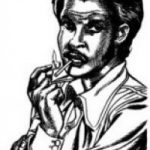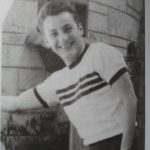Foster. Richard. 1998. The Real Bettie Page: The Truth About the Queen of the Pinups. Carol Publishing Group.
I approached this book looking for information on the 1950s bondage picture and stag reel culture Page was a part of, when she was one of the most popular models working for Irving Klaw. I didn’t find anything I hadn’t already learned, and it left me as puzzled as I was before.

Bettie Page as the Dark Angel
Bettie Page was, undeniably, a beautiful woman with a curvaceous body and a megawatt-intensity smile. She was neither an intimidating vamp nor a vulnerable girl-woman like Marilyn Monroe. Even in the Irving Klaw bondage and fetish shoots and loops, she could look like she was having fun. Her heavy black bangs became an icon.
Like fellow early Playboy Playmate Marilyn Monroe, Page’s modelling career abruptly ended, but with a mysterious disappearance instead of a tragic suicide. A few claimed she had been killed by the mob, but most agreed she was still alive, with stories ranging from having a husband and kids to doing missionary work to living in a mental institution.
Page, the image, attained a kind of mystique far beyond any flesh and blood woman. She became Marilyn Monroe for hipsters, a sex symbol and style icon, forever frozen in her prime with her black bangs. She both harkened back to the days of Vargas Girls and gestured forward to the modern fetish subculture. Yet she herself was a mystery, never a speaking subject. What did a woman who had been molested by her father as a girl, and had done missionary work in Haiti, and was a near tee-totaller and part-time school teacher, think of her iconic status as the queen of bondage?
Foster’s book endeavours to tell Page’s full life, but this is an unauthorized biography. The only direct contact Foster had with Page was a single letter she sent him before he started on the book. Nearly all of the material is from second and third hand accounts, and some of them are a bit suspect.
There’s also two areas where I think Foster went beyond journalism into exploitation.
The first is documenting Page’s descent into paranoid schizophrenia. This is something far too many people suffer through, and Page’s story was mostly just sad. Her authorized biography says that she lived with her brother for 9 years, but Foster asserts she was wandered from place to place and was eventually institutionalized after she became violent. Foster’s excruciatingly detailed reconstructions of Page’s supposed outbursts don’t do any good to her or the people she allegedly assaulted. Not all stories need to be told in gory details.
The second is the legal squabbling over Page’s likeness and legacy and the money they generated. Foster’s unauthorized work, which has been criticized by Page fans for inaccuracies, is just another attempt to cash in on her.
I’m tempted to say that Foster’s book ultimately fails in that it doesn’t deliver any real insight into who Page was, or why she did the things she did. However, Page’s life is so opaque that I can’t really blame him for that. The real Bettie Page remains such a shadowy figure, rarely photographed and only giving the occasional audio tape or letter, that even the more unlikely scenarios seem plausible, like the claim that the woman glimpsed in the 1990s is actually an imposter.
So what did Page think of her career as fetish queen? It’s hard to say, as Page herself was notoriously reclusive. Was she a good Christian girl, damaged by childhood abuse, who wandered into a scene that exploited her, or was she a tigress with an eye for young muscular men and who loved the spotlight? There are rumored to be certain hardcore shots of her, which she later claimed all came from a single night of drunkeness in an otherwise sober life. [See Pg.137] She also said she hated the raunchier pictures of her smoking.
The most plausible account in Foster’s book actually comes from J.B. Rund, a publisher, expert on erotica, and who was briefly Page’s agent in 1996. [Pg. 135-136] He said that Page’s seven-year modelling career and her forays into Hollywood were just a minor diversion on a life devoted to Christian faith and academic study.
…Rend says that he found Bettie’s take on the picture, particularly the Klaw Bondage photos, to be innocent and “naive.”
“She said, ‘Irving used to get suggestions from his customers as to what kind of photos they wanted to see. A lot of Irving’s customers liked me with a ball gag in my mouth.’ Very matter of fact,” Rund recalls.
“I realized right then and there that she doesn’t understand any of this. She doesn’t understand foot fetishism or bondage. I said, ‘Bettie, does it ever occur to you that guys are masturbating over these photos?’ and she says, ‘Yeah, I guess so,’ you know, like it doesn’t matter. She had no understanding of any of this.
“She said to me she thought it was funny. She does not understand that people get erections from it. Her sexual interests are very normal. Bettie still drinks milk.”
He says, “The thing is, she really doesn’t have anything revealing to say about her work. She went there and posed and that’s it.” [Pg.172-173]
Is that it? So many of the men who reminisce about Page talk about her as innocent, as pure. Page wasn’t a fool; many of the men described her as intelligent and well-informed. Perhaps Page was playing another role, one that she understood her fans wanted. Was Page retroactively revising her own biography as she lived it?
Her fan club president, Steve Brewster, who has met her, said:
“She’s a very devout Christian lady,” Brewster says. “She takes her religion very seriously. We’ve had some discussions about it. She’s not ashamed of her past. She said she does not feel guilty then or now. She has a very positive attitude about her career. She thinks those sever or eight years she modeled were kind of a time in her life when she was kind of lazy. The time period we think of as the Golden Age of Bettie Page, to her, she kind of kicked back in New York and made a few dollars modeling. She left New York and went to Bible college and started her real career.[“] [Pg. 174]
Perhaps Page was such a recluse before her death was because if she went into the public eye, she would have to express some kind of opinion about her career as a model. She’d either have to repudiate it or champion it; either way, it would define her life, and obscure anything else.



